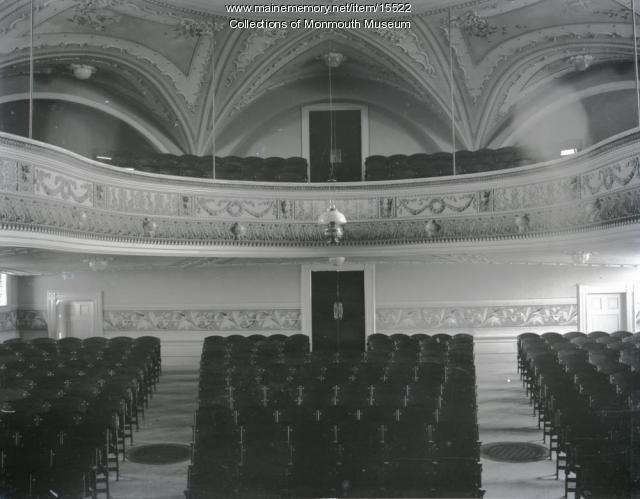Keywords: Fur Business
- Historical Items (57)
- Tax Records (0)
- Architecture & Landscape (0)
- Online Exhibits (15)
- Site Pages (89)
- My Maine Stories (0)
- Lesson Plans (1)
Online Exhibits
Your results include these online exhibits. You also can view all of the site's exhibits, view a timeline of selected events in Maine History, and learn how to create your own exhibit. See featured exhibits or create your own exhibit
Exhibit
Northern Threads: Colonial and 19th century fur trade
A vignette in "Northern Threads: Two centuries of dress at Maine Historical Society Part 1," this fur trade mini-exhibition discusses the environmental and economic impact of the fur trade in Maine through the 19th century.
Exhibit
When Europeans arrived in North America and disrupted traditional Native American patterns of life, they also offered other opportunities: trade goods for furs. The fur trade had mixed results for the Wabanaki.
Exhibit
Maine's ample woods historically provided numerous game animals and birds for hunters seeking food, fur, or hides. The promotion of hunting as tourism and concerns about conservation toward the end of the nineteenth century changed the nature of hunting in Maine.
Exhibit
Northern Threads: Two centuries of dress at Maine Historical
Organized by themed vignettes, Northern Threads shares stories about Maine people, while exploring how the clothing they wore reveals social, economic, and environmental histories. This re-examination of Maine Historical Society's permanent collection is an opportunity to consider the relevance of historic clothing in museums, the ebb and flow of fashion styles, and the complexities of diverse representation spanning 200 years of collecting.
Exhibit
Begin Again: reckoning with intolerance in Maine
BEGIN AGAIN explores Maine's historic role, going back 528 years, in crisis that brought about the pandemic, social and economic inequities, and the Black Lives Matter movement in 2020.
Exhibit
Home: The Longfellow House & the Emergence of Portland
The Wadsworth-Longfellow house is the oldest building on the Portland peninsula, the first historic site in Maine, a National Historic Landmark, home to three generations of Wadsworth and Longfellow family members -- including the boyhood home of the poet Henry Wadsworth Longfellow. The history of the house and its inhabitants provide a unique view of the growth and changes of Portland -- as well as of the immediate surroundings of the home.
Exhibit
For one hundred years, Acadia National Park has captured the American imagination and stood as the most recognizable symbol of Maine’s important natural history and identity. This exhibit highlights Maine Memory content relating to Acadia and Mount Desert Island.
Exhibit
Scientist, author and explorer Donald B. MacMillan established Wiscasset as his homeport for many of the voyages he made to the Arctic region starting in the early 1920s.
Exhibit
Music in Maine - Opera, Orchestras and Stages
"… off stage—using luxurious fabrics like trimmed fur and delicate silks. Lush velvet fabrics were popular among the opera crowds.Opera attendees…"
Exhibit
Immigration is one of the most debated topics in Maine. Controversy aside, immigration is also America's oldest tradition, and along with religious tolerance, what our nation was built upon. Since the first people--the Wabanaki--permitted Europeans to settle in the land now known as Maine, we have been a state of immigrants.
Exhibit
Dressing Up, Standing Out, Fitting In
Adorning oneself to look one's "best" has varied over time, gender, economic class, and by event. Adornments suggest one's sense of identity and one's intent to stand out or fit in.
Exhibit
Bookplates Honor Annie Louise Cary
A summer resident of Wayne collected more than 3,000 bookplates to honor Maine native and noted opera singer Annie Louise Cary and to support the Cary Memorial Library.
Exhibit
The history of the region now known as Maine did not begin at statehood in 1820. What was Maine before it was a state? How did Maine separate from Massachusetts? How has the Maine we experience today been shaped by thousands of years of history?
Exhibit
Holding up the Sky: Wabanaki people, culture, history, and art
Learn about Native diplomacy and obligation by exploring 13,000 years of Wabanaki residence in Maine through 17th century treaties, historic items, and contemporary artworks—from ash baskets to high fashion. Wabanaki voices contextualize present-day relevance and repercussions of 400 years of shared histories between Wabanakis and settlers to their region.
Exhibit
CODE RED: Climate, Justice & Natural History Collections
Explore topics around climate change by reuniting collections from one of the nation's earliest natural history museums, the Portland Society of Natural History. The exhibition focuses on how museums collect, and the role of humans in creating changes in society, climate, and biodiversity.














